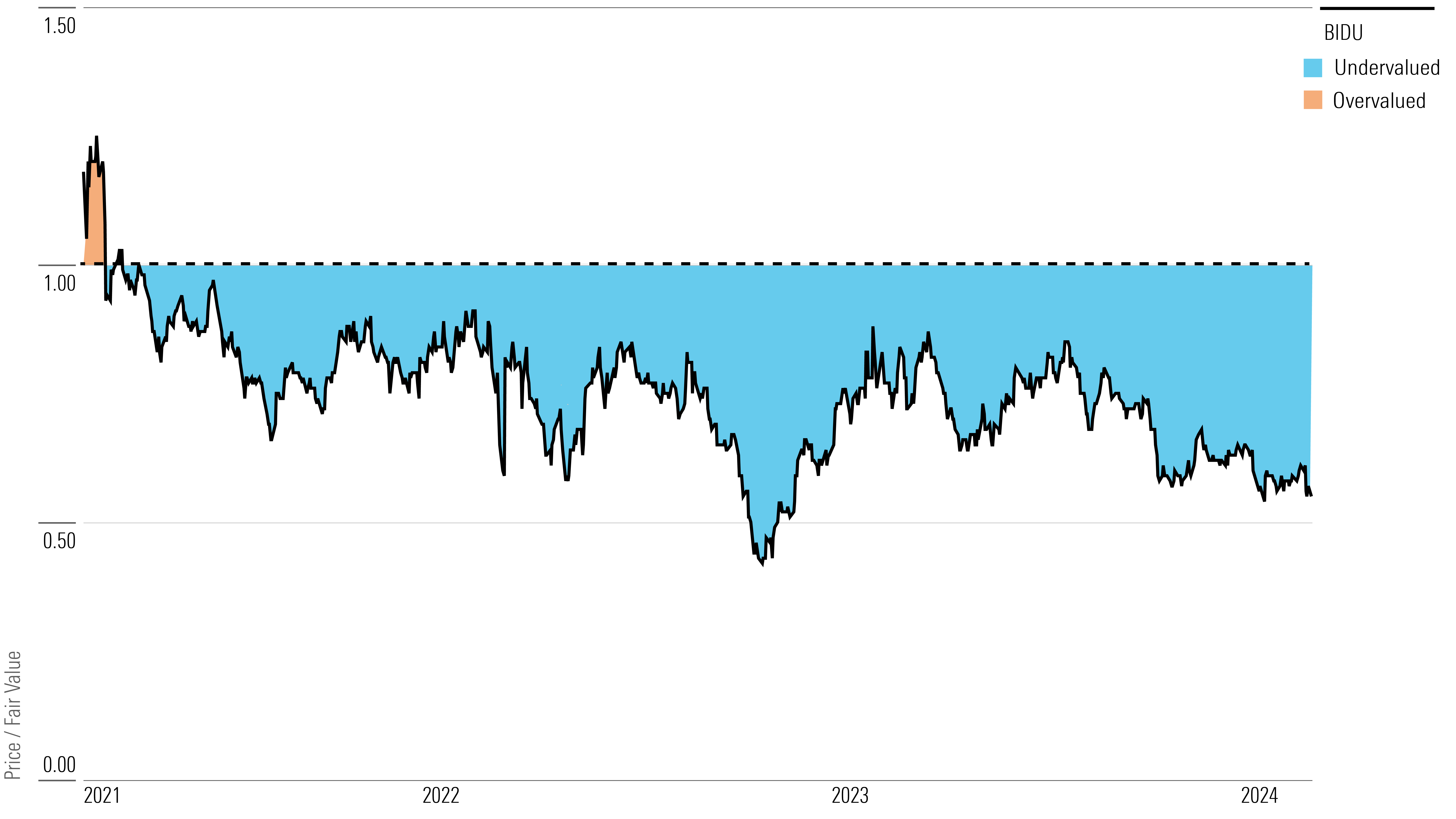After Earnings, Is Baidu Stock a Buy, a Sell, or Fairly Valued?
With the long-term potential of AI guiding forecasts, here’s what we think of Baidu stock.

Baidu BIDU released its fourth-quarter earnings report on Feb. 28. Here’s Morningstar’s take on Baidu’s earnings and stock.
Key Morningstar Metrics for Baidu
- Fair Value Estimate: $183.00
- Morningstar Rating: 5 stars
- Morningstar Economic Moat Rating: Wide
- Morningstar Uncertainty Rating: High
What We Thought of Baidu’s Q4 Earnings
- Revenue was in line with expectations, but operating margins were lower than expected due to lower advertising revenue (which has high operating leverage) and the cost of Baidu’s artificial intelligence projects. We think while the AI costs are likely short-term and should improve over time as computing power and architecture get better, there is some concern over the growth of the advertising business in the medium term. It is driven by China’s macro performance, and Baidu did not have good visibility for it in 2024.
- If an investor still wants exposure to AI leadership in China, Baidu would be the best choice, as the firm’s cloud revenue is outgrowing that of competitors on the back of its AI products. Despite the macro weakness, advertising is also seeing a slight growth uptick due to AI. On the flip side, China’s macro weakness and geopolitical risks in general may scare off investors who prefer near-term stability.
- Given the long-term potential of Baidu’s AI products, we think shares look cheap when thinking beyond the near-term headline risks for China. For example, cloud revenue was forecast to grow in mid-single digits in 2024, but because of AI, it is now expected to reach double digits, which should offset some of the macro weakness.
Baidu Inc ADR Stock Price
Fair Value Estimate for Baidu
With its 5-star rating, we believe Baidu’s stock is undervalued compared with our long-term fair value estimate of $183. The firm’s main revenue drivers will come from the Baidu Core businesses, mainly online advertising and AI cloud. Online advertising still accounts for 79% of Core revenue, and it will dictate near-term growth. However, growth has been decelerating, and long-term growth will likely hinge on the company’s AI cloud and smart driving businesses. We forecast a near-term (five-year) compound annual growth rate of 6% for Core online advertising, amid intensifying competition. Combined with Baidu’s other businesses, including iQiyi and AI Cloud, it should contribute to a 10% overall five-year CAGR.
Margins are also a key value driver. There is a lack of scalability for iQiyi due to the constant need to incur high content costs, and this will create margin drag. We also believe AI Cloud and emerging technologies will see greater R&D spending, given their early life cycles, and thus Baidu’s fair value estimate will be dictated by when (if at all) these businesses can monetize with scale. We’ll use conservative margins in our forecast until there is better visibility for these initiatives.
Read more about Baidu’s fair value estimate.
Baidu Historical Price/Fair Value Ratio

Economic Moat Rating
Baidu has a wide moat thanks to a network effect created by its dominant share of the user base and intangible assets stemming from years of R&D in AI. As one of the earliest internet companies in China, Baidu has built an ecosystem around search and successfully shifted to mobile internet by releasing various well-received mobile apps, such as its flagship Baidu app, which had 580 million monthly active users as of the second quarter of 2021, and Baidu Maps. According to web analytics firm Statcounter, Baidu’s market share as of September 2021 was 82.5%, compared with its closest Chinese competitor Sogou at 7.6%.
Baidu has a large database of user behavior data in China, which its AI search engine has accumulated over almost two decades. This is critical in generating the most relevant results, which leads to increased usage, more data, and higher advertising efficiency. Meanwhile, Baidu has built up a network effect and a positive feedback loop in its search business by leveraging its significant search traffic on both PC and mobile devices.
This is difficult for its competitors to replicate, as it would take a long time to reach a user database and marketing customer base of a similar size. The larger its user base, the more data Baidu can collect and analyze, improving the search engine algorithm and the relevancy of search results. Users receive better, more tailored recommendations, making it less likely that they’ll use another search engine. With so much user data, Baidu can provide personalized advertising strategies so advertisers can better target customers. This results in advertisers becoming more willing to pay more for promoted ads and priority positioning.
Read more about Baidu’s moat rating.
Risk and Uncertainty
We think Baidu faces intense competition and uncertainty as to whether its AI business will generate satisfactory returns. Though it’s the largest search engine in China, the firm is competing with Tencent and ByteDance. It also competes with other internet companies for advertising dollars. Baidu’s margins have declined because of aggressive spending on video content and its mobile business.
Baidu also competes in AI, such as cloud computing, voice and image recognition, and autonomously driven cars. At the current stage, it is difficult to predict whether it will be the final winner here and if the ROI will be adequate.
Read more about Baidu’s risk and uncertainty.
BIDU Bulls Say
- Baidu is strengthening its mobile ecosystem with search, livestreaming, and mini-programs, helping to create a closed-loop experience for users to acquire information and make transactions.
- Baidu leads autonomous driving in terms of the number of miles tested, and the number of driving licenses in China could become another growth catalyst.
- Sitting on a cash pile of over CNY 100 billion, Baidu has ample dry powder to invest in technology, particularly in AI, as well as merger and acquisition opportunities.
BIDU Bears Say
- Alibaba BABA, Tencent, ByteDance, Kuaishou, and other social media platforms are competing with Baidu’s advertising budget, which will result in slow growth in revenue for Baidu search.
- Despite numerous growth initiatives, there is great uncertainty as to whether these new businesses can be monetized successfully on a mass scale. Failure to do so would result in heavy margin drag.
- Baidu’s leadership and brand in search have been weakened by more competitors entering the market, and could also be affected by future regulatory risks.
This article was compiled by Quinn Rennell
The author or authors do not own shares in any securities mentioned in this article. Find out about Morningstar’s editorial policies.


/cloudfront-us-east-1.images.arcpublishing.com/morningstar/GJMQNPFPOFHUHHT3UABTAMBTZM.png)
/cloudfront-us-east-1.images.arcpublishing.com/morningstar/ZYJVMA34ANHZZDT5KOPPUVFLPE.png)
/cloudfront-us-east-1.images.arcpublishing.com/morningstar/LDGHWJAL2NFZJBVDHSFFNEULHE.jpg)